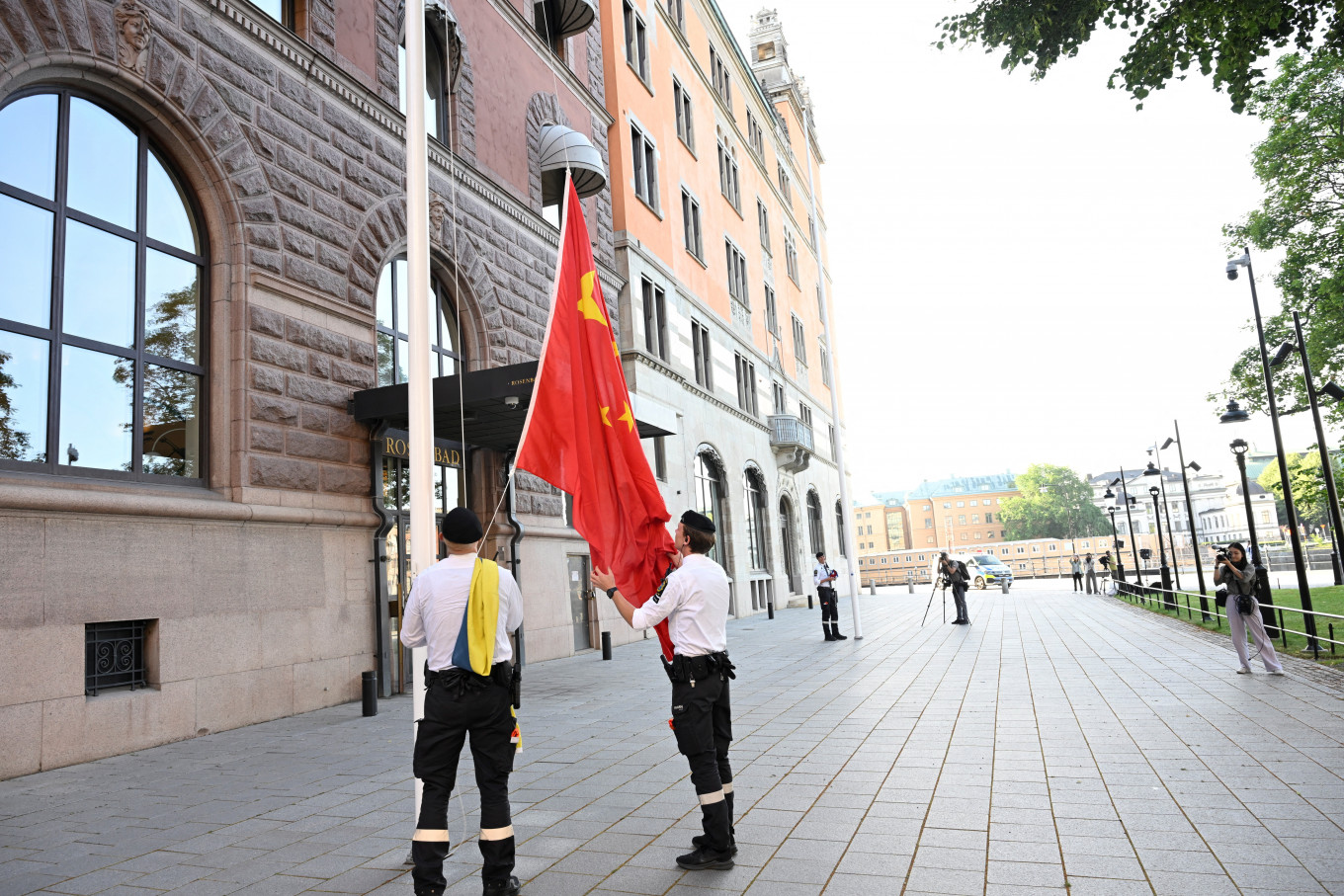Popular Reads
Top Results
Can't find what you're looking for?
View all search resultsPopular Reads
Top Results
Can't find what you're looking for?
View all search resultsUS, China to launch new talks on tariff truce extension, easing path for Trump-Xi meeting
Change text size
Gift Premium Articles
to Anyone
T
op US and Chinese economic officials will resume talks in Stockholm on Monday to try to tackle longstanding economic disputes at the center of a trade war between the world's top two economies, aiming to extend a truce by three months and keeping sharply higher tariffs at bay.
China is facing an August 12 deadline to reach a durable tariff agreement with President Donald Trump’s administration, after Beijing and Washington reached preliminary deals in May and June to end weeks of escalating tit-for-tat tariffs and a cut-off of rare earth minerals.
Without an agreement, global supply chains could face renewed turmoil from US duties snapping back to triple-digit levels that would amount to a bilateral trade embargo.
The Stockholm talks come hot on the heels of Trump's biggest trade deal yet with the European Union on Sunday for a 15-percent tariff on most EU goods exports to the US, including autos. The bloc will also buy US$750 billion worth of American energy and make $600 billion worth of US investments in coming years.
No similar breakthrough is expected in the US-China talks but trade analysts said that another 90-day extension of a tariff and export control truce struck in mid-May was likely.
An extension of that length would prevent further escalation and facilitate planning for a potential meeting between Trump and Chinese President Xi Jinping in late October or early November.
A US Treasury spokesperson declined comment on a South China Morning Post report quoting unnamed sources as saying the two sides would refrain from introducing new tariffs or other steps that could escalate the trade war for another 90 days.
Trump's administration is poised to impose new sectoral tariffs that will impact China within weeks, including on semiconductors, pharmaceuticals, ship-to-shore cranes and other products.
"We're very close to a deal with China. We really sort of made a deal with China, but we'll see how that goes," Trump told reporters on Sunday before European Commission President Ursula von der Leyen struck their tariff deal.
The Financial Times reported on Monday that the US had paused curbs on tech exports to China to avoid disrupting trade talks with Beijing and support Trump's efforts to secure a meeting with Xi this year.
The industry and security bureau of the Commerce Department, which oversees export controls, had been told to avoid tough moves on China, the newspaper said, citing current and former officials.
Reuters could not immediately verify the report. The White House and the department did not respond to Reuters' requests for comment outside business hours.
DEEPER ISSUES
Previous US-China trade talks in Geneva and London in May and June focused on bringing US and Chinese retaliatory tariffs down from triple-digit levels and restoring the flow of rare earth minerals halted by China and Nvidia's H20 AI chips and other goods halted by the United States.
So far, the talks have not delved into broader economic issues. They include US complaints that China's state-led, export-driven model is flooding world markets with cheap goods, and Beijing's complaints that US national security export controls on tech goods seek to stunt Chinese growth.
"Geneva and London were really just about trying to get the relationship back on track so that they could, at some point, actually negotiate about the issues which animate the disagreement between the countries in the first place," said Scott Kennedy, a China economics expert at the Center for Strategic and International Studies in Washington.
"I'd be surprised if there is an early harvest on some of these things but an extension of the ceasefire for another 90 days seems to be the most likely outcome," Kennedy said.
US Treasury Secretary Scott Bessent has already flagged a deadline extension and has said he wants China to rebalance its economy away from exports to more domestic consumption -- a decades-long goal for US policymakers.
Analysts say the US-China negotiations are far more complex than those with other Asian countries and will require more time. China's grip on the global market for rare earth minerals and magnets, used in everything from military hardware to car windshield wiper motors, has proved to be an effective leverage point on US industries.
TRUMP-XI MEETING?
In the background of the talks is speculation about a possible meeting between Trump and Xi in late October.
Trump has said he will decide soon on a landmark trip to China, and a new flare-up of tariffs and export controls would likely derail planning.
Sun Chenghao, a fellow at Tsinghua University's Center for International Security and Strategy in Beijing, said that a Trump-Xi summit would be an opportunity for the US to lower the 20 percent tariffs on Chinese goods related to fentanyl. In exchange, he said the Chinese side could make good on its 2020 pledge to increase purchases of US farm products and other goods.
"The future prospect of the heads of state summit is very beneficial to the negotiations because everyone wants to reach an agreement or pave the way in advance," Sun said.
Still, China will likely request a reduction of multi-layered US tariffs totaling 55 percent on most goods and further easing of US high-tech export controls, analysts said. Beijing has argued that such purchases would help reduce the US trade deficit with China, which reached $295.5 billion in 2024.










